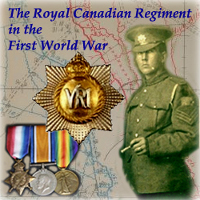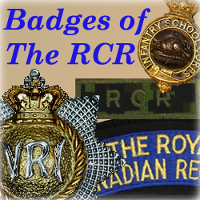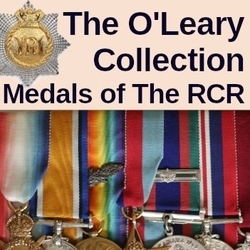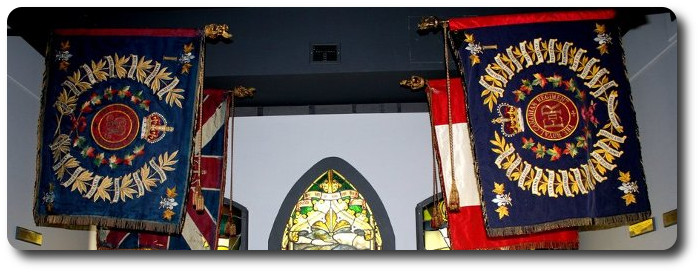
Researching The Royal Canadian Regiment
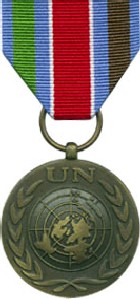
UNPROFOR was established in February 1992 as an interim arrangement to create the conditions of peace and security required for the negotiation of an overall settlement of the Yugoslavian crisis. The UN Protection Force (Yugoslavia) (UNPROFOR) Medal was awarded for 90 days consecutive service from 01 March 1992 to 19 December 1995.
3 RCR'S Yugoslavia Story
The Connecting File 1992
The 3rd Battalion sent over 280 soldiers to participate in Peacekeeping operations in Yugoslavia (OP HARMONY). Except for a section of pioneers that went with 4 CER, all deployed under command of 1 R22eR. The 3 RCR elements with 1 R22eR were November Company (Maj Peter Devlin), Recce Platoon (Capt Dave Ready) and numerous individual augmentees. This is their story of their six-month tour in that wartorn land.
OPERATION HARMONY - CROATIA - SPRING 92
In March and April, the troops selected for OP HARMONY were put through three weeks of intensive training on essential skills such as first aid, self-defence, weapons handling, explosive ordnance awareness and the recognition of weapons, mines, and booby traps. They also received briefings on Yugoslavia's terrain, climate, industry, politics, religion, language, and culture. On 26 March, 1992, the Battalion had a formal parade to say goodbye to its OP HARMONY personnel and on 11 April the RCR train pulled out of the Soellingen railhead bound for DARUVAR, Croatia.
The first night in theatre proved to be an eventful one and a taste of things to come. Just as the company was settling into its bivouac at SIRAC, Croatia the area was hit by ten rounds from a 120 mm Mortar Battery. Fortunately, no one was hurt. Cpl Brent Demerchant became the camp celebrity after the event as he had inadvertently left his tape recorder running as everyone sprinted to the APCs. He must have had something more pressing on his mind!!
While the Battle Group awaited the arrival of the Jordanian, Nepalese, and Argentinean contingents, the Canadians patrolled these additional sectors to show the UN flag. When they weren't patrolling they were busy trying to convert bombed out buildings into platoon houses. The initial state of some of the structures taxed the imagination and resourcefulness of the Section Commanders. But in true Royal spirit, the NCOs came up with designs and "scrounged" materials to help get construction under way.
When the other contingents moved in, it looked as if life in Croatia would finally settle into some sort of a routine. This was not to be. Canada had agreed to a UN request to assign the Canadian battalion group from peacekeeping duties to the security of the SARAJEVO Airport to enable relief flights to come in.
SARAJEVO - SUMMER 92
The highlight of the peacekeepers' tour was their month long experience in war torn SARAJEVO. After being on stand-by for the task for three weeks in SIRAC, and with the troops losing patience, the order to move was cut. Within eight hours of the O Group's completion, the recce party, departed followed by the main body the next evening. The road move started on 30 June with the target arrival date in SARAJEVO being Canada Day. This did not happen. The convoy spent a frustrating day held up enroute by Territorial Defence Forces (TDF) until they finally arrived in the city late on the evening of 2 July.
Much of the success of the road move must be accredited to the mechanics, under MCpls Ross Pettit and Ben Garneau, who kept the fleet of vehicles moving. After a 48 hour, 350 km road move, no one was given much time for rest as the relief flights had started to land while the Battle Group was still en route. The pace of work for the next month in SARAJEVO was set that night as the soldiers worked 15-18 hour days escorting relief convoys throughout the city.
Bombardment and sniper rifle were part of the soldier's daily life in SARAJEVO. It started the first day in the city when WOs Joe Parsons, Terry Riddle and Sgt Bill Crawford spent most of their time finding cover against sniper fire while trying to complete a recce of the Holiday Inn. That accommodation plan was quickly abandoned. Maj Peter Devlin, Lt Pat Dray, and their driver Cpl James Gordon were injured on 19 June when a mortar bomb exploded near their jeep. As the operation progressed, the sniper fire became so bad that Canadian Peacekeepers resorted to returning fire. The first to do so was Sgt Don McDade's section when his convoy escort A PC was hit by a sniper's bullet. The sniper was effectively neutralized by MCpl Roll MacDonald and Cpl Nick Dorrington as they fired 10 rounds into the culprit's sand-bagged position while the section extracted themselves from the area. Marksmanship badges are definitely in order for these two soldiers whose rounds were observed on target even though they fired from a moving A PC. On 13 July, Cpl Glen Whit ten of Recce Platoon was grazed by a ricochet while performing convoy escort duty, and Cpl Gerry Hebert was later injured in the leg by shrapnel from the shot of a sniper who was harassing the airport. Both were treated and returned to work immediately.
On 9 July 1992, our luck ran out. Cpl Dennis Reid lost his right foot as a result of stepping on an antipersonnel mine while working on the wire fence around Beaver Camp. After spending time in a Sarajevo hospital, he was evacuated to Lahr to be cared for by doctors at 313 Field Hospital. He is well on the road to recovery and rehabilitation, well supported by the Battalion, his parents and his German fiancee.
While the snipers were not very active against the Peacekeepers at night, our men didn't get much rest. The nightly battles between the warring factions crept in on both the November Company and Recce PI areas. The soldiers in both locations spent several nights under shelter as weapons effects ripped around their buildings. On the night of 12 July, Beaver Camp and the surrounding area was shelled by heavy mortars for three hours. Life became very interesting at the very outset of the experience as the POL compound was hit, spilling fuel throughout the area. Once the firepower demonstration came to an end, damage was assessed. Sixteen rounds had impacted directly on buildings in Beaver Camp but no one was injured. Our luck was back! Recce Pl soldiers had a similar experience, the most significant of them being on the night of 21 July. Several of their soldiers were throwing candy to young teenagers from their window when eight mortar bombs exploded amongst the children. One of the civilians was killed and most were seriously injured. The injured civilians survived due to the reaction and excellent first aid treatment administered by the recce soldiers, some of whom had received minor injuries themselves. The soldiers may never forget the gruesome scene of that night but their efforts will be equally memorable to those whose lives they saved.
The evening bombardment was not just "incoming," as the TDF used Beaver Camp to shield a medium mortar section which fired almost nightly just outside the perimeter wire. The assumption was made that much of the indirect fire the camp received was CB fire directed at this active mortar section. MGen MacKenzie decided to take action against the mortars and November Company was tasked with two covert observation posts to observe likely baseplate positions. A platoon was placed on five minutes notice to move with the mission of capturing the mortars and placing the weapons under UN supervision. Sgts Steve Shirley and Ted Stoneham commanded these patrols. Sgt Shirley identified a vacant mortar position and during his 35 hour watch, the reserve platoon rolled. He reported his observation post was surrounded by a TDF platoon which had deployed to secure the industrial compound that his post had occupied. The sound of approaching APCs caused the TDF to position a RPG cut-off team to cover their withdrawal from the area. November Company permitted the mF platoon to withdraw and there were no further reports of outgoing mortar fire around the camp. After a brief rest, Sgt Shirley took his patrol out a second time to that area but made no contact.
Through all of this, the convoy escorts carried on. Special relief operations were conducted with the assistance of the battalion liaison cell to areas completely cut off by the fighting. These missions added even more excitement to the routine. On 21 July, November Company moved to open a new Relief Distribution Centre. Before the trucks were even en route, Maj Peter Devlin and his command and liaison party were held hostage by the TDF who refused to allow the relief supplies across their line. The situation became more intense as the TDF sealed off the area and called for reinforcement. The soldiers stood their ground and did what any Royal would do in that situation -brew up! Orders were set to the Company Recce PI, commanded by Capt Rob Boyd to move to a position to provide fire support to help extract Company HO. Fortunately the orders never had to be executed as the situation was resolved by negotiation between MGen MacKenzie and the Bosnian Presidency. Not all special relief operations had such dramatic military overtones. Lt Angus Matheson and his platoon negotiated the passage of a pregnant woman out of the Muslim village of BUTMIR despite the fact that they were surrounded by Serbian held territory. On the second last day of their tour in SARAJEVO, November Coy successfully opened the land corridor into the city.
CROATIA - SUMMER 92
The Battle Group was replaced in SARAJEVO by troops from France, Egypt and the Ukraine and all Canadian troops were clear of the city by 3 August. They redeployed back to the relative quiet of their old area in Croatia. Just to remind them that there was no place in the former Yugoslavia that is safe, Sgt Ralph, a Canadian Engineer, was killed and one Sapper injured in Sector West a few days after their return a tragic reminder to all of the dangers that Peacekeepers everywhere must face on a day to day basis.
In the first six weeks after returning to Croatia, November Company lived up to their gypsy lifestyle by redeploying three times. Boundaries of the Canadian sector were shifted south to include the town of PAKRAC. The company set up in SIRAC on arrival from SARAJEVO until they could arrange for new accommodations. Once the move was complete, boundaries were again changed as there was a requirement for a greater permanent UN presence on the Serbian side of the cease-fire line.
Accommodations to suit the new operational plan were difficult to secure given the extent of destruction in the area added to November Company's sector. The situation was pressing given the impending arrival of both 3 PPCLI Battle Group and winter. The final redeployment of the company kept everyone extremely busy completing extensive renovations on the new buildings while performing their peacekeeping duties. The work was still not completed as the first of our men rotated home. That put an even greater load on the last personnel to leave who had to finish the job.
Although Sector West had calmed considerably since its demilitarization, there was still work for the UN to do. Illegal weapons and the occasional military vehicle were confiscated on a regular basis. Mobile patrols were conducted in PAKRAC each night and resulted in the discovery of Croatian Police carrying unauthorized AK-47s and grenades stashed under car seats. The tension of the civilian population was evident. In exchanges between warring factions houses were destroyed and at night the sounds of light small arms fire and explosions were common. The first week back in Sector West saw 7 Platoon conduct a rescue mission in the Nepalese Sector. Several of the Nepalese soldiers were caught in a mortar bombardment and 7 Platoon reacted quickly to extract the Nepalese out of danger before anyone was hurt.
In the last few weeks of November Company's tour, the tension between the UN and Croatians intensified. Cease fire violations were not exclusively directed against the Serbs as the UN occasionally became a target. The company HO building was hit by a grenade followed by light small arms fire on two occasions. On another day, the jeep Cpl Casey was driving developed a 7.62 mm ventilation hole when he was approaching PAKRAC. Thankfully he was not hurt. Incidents occurred right up, to and during the handover with 3 PPCLI including a company cordon and search operation. The catalyst for this last operation was again one of our jeep patrols being fired upon. A recce group was dispatched and successfully located the source of fire. The operation expanded to a cordon of several apartment complexes and eight section-size teams searched the buildings. The weapons and ammunition seized was the largest cache found in Sector West up to that time. Items confiscated included six anti-tank rifle grenades, many hand grenades, several hand guns, four AK 47 assault rifles (one equipped with a silencer), field phones, night vision devices and a huge quantity of ammunition with plenty of match rounds. This event demonstrated to 3 PPCLI that stringent vigilance was still required.
Once the first of the Royals were safely back in CFB Baden, on 7 October a "Welcome Home" reception was held for the soldiers. At the reception the Company thanked the rear party headed by Capt Bruce Pennington and Sgt Sheldon Gordon for their attention to their families' needs while they were away. They also got an opportunity to meet the school children who had become their pen pals through a programme established by teacher, Beverly Ruberg. For some, the fest-tent carried on well into the night and for those who had just arrived hours before the celebrating was carried on into the wee hours of the morning.
A Peacekeeper's Day and a parade in Lahr filled the 8 October. The men were congratulated by the guest speaker, BGen Clive Addy, and their Brigade Commander, Colonel Robert Meeting. The highlight of the parade, occurred when Cpl Dennis Reid marched out to receive his UN medal on his new prosthesic foot. The whole Brigade cheered for him. It was a morale-lifting event and an excellent way to conclude our peacekeeping experience.
With their UN tour over, all members of 3 RCR who served in Croatia and SARAJEVO, carry with them a lifetime of memories of a very dangerous and difficult job. They can be justly proud of their performance. In their six-month tour they were a credit not only to their Regiment but to their country as well.
